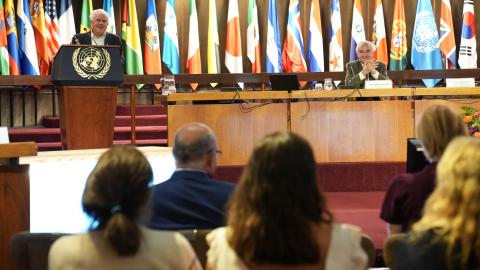News
A radical transformation of the labor market is an essential condition for socially inclusive growth in Latin America and the Caribbean. This requires a substantial overhaul of the social protection architecture, Santiago Levy, a prominent Mexican economist and politician, sustained today in a keynote lecture delivered at the main headquarters of the Economic Commission for Latin America and the Caribbean (ECLAC) in Santiago, Chile.
“We have to overcome the formal-informal dichotomy with a different social protection architecture. ECLAC has shown the way. Its calls for universalizing social security, apart from its immense social benefits, open the door for starting to overcome the negative linkage we are having between social protection and productivity in the region,” affirmed Santiago Levy, who was received by ECLAC’s Executive Secretary, José Manuel Salazar-Xirinachs.
The Nonresident Senior Fellow at the Brookings Institution participated in the Keynote Lecture Series organized to commemorate ECLAC’s 75th anniversary. Levy gave a presentation entitled “Social protection and productivity in Latin America,” which is the seventh such event in the series that began in July and will run through February 2024.
At the start of his presentation, Levy recalled that Latin America is one of the most unequal regions in the world, despite significant increases in social protection spending, which rose from around 7% of GDP in 1990 to 14% in 2020. He added that it is also one of the regions in the world that grows the least, mainly due to stagnant productivity: between 1990 and 2017, the average growth rate of total factor productivity in the region was (–) 0.08%.
“Economic activity in Latin America and the Caribbean is very dispersed. Around 50% of the economically active population is either self-employed or employed in companies with fewer than five workers. There are many very small companies, the vast majority of them informal,” he warned.
In his presentation, the former general director of the Mexican Social Security Institute stressed that there is an incompatibility in the region between the social protection architecture and productivity.
“Social protection policies segment the labor market, they skew the allocation of resources towards smallness and informality, distort supply chains and contribute to a dysfunctional business dynamic,” he contended.
The speaker, also a scholar, highlighted the numerous contributions made by ECLAC, emphasizing in particular its contributions on social protection and productive transformation.
“ECLAC has studied the area of social policies and production policies. It is necessary to further study this link, which is very important. We economists have divided the world into two big parts: social policies and social protection, and production policies. That has been a conceptual error. Social protection is a production policy, for better or worse, but it is,” he said.
In his remarks, José Manuel Salazar-Xirinachs, ECLAC’s Executive Secretary, stressed that among the challenges the region is facing, low economic and productivity growth, and social protection systems’ coverage gaps and weaknesses, are related challenges that stand out.
“Today we continue the lecture series with which we are celebrating ECLAC’s history and achievements but also, and above all, these lectures challenge and inspire us to reflect and to further explore our ideas and analyses to support countries in building a more productive, inclusive and sustainable future,” he stated.
He emphasized that Santiago Levy has contributed not only to better understanding the problems of poverty, competitiveness, exchange rate and trade policies in the academic realm, but also to tackling them and overcoming them in the public service arena.
“Thinking in order to do, and doing by reflecting and analyzing, is what Santiago Levy has done, and that is what ECLAC does too. That is why this lecture is particularly appropriate in this series for ECLAC’s 75th anniversary, to celebrate our history and to strengthen our capacity to face the future,” he concluded.
Santiago Levy is the seventh lecturer to participate in the series organized to celebrate the seventy-fifth anniversary of ECLAC, which was founded in 1948 as one of the United Nations’ five regional commissions.
Through February 2024, other prominent thinkers will visit the Commission’s headquarters in Santiago to present their views and ideas about the challenges facing the world and the region. The full list of lecturers is available here.



